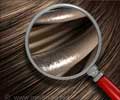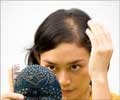Eating disorders in women may be diagnosed by examining hair strands, which are described by scientists as "chemical diaries". It is usually difficult to diagnose eating disorders, as people don’t realize that they have a disorder or they try to hide it.
The study conducted by a research team at the Brigham Young University (BYU) in U.S. is published in the Rapid Communications in Mass Spectrometry journal. According to the researchers, eating disorders treatment may be assisted by analysis of carbon and nitrogen molecule in the hair strands."Your body records your eating habits in the hair. So, we can use that to tell the nutritional health of an individual," said lead researcher Kent Hatch, an assistant professor of integrative biology at BYU.
"As hair grows, new proteins are added to the base of each strand, pushing the strand up and out of the hair follicle. These proteins are influenced by what you eat. And the nutritional state of each individual is affected by his or her eating patterns. So, each strand of hair is a chemical "diary" that is a record of day-by-day nutrition, " the researcher said.
The researchers had a success rate of 80% by using their method to detect anorexia or bulimia. Kent Hatch writes: "The test needs further validation before it will be ready for routine clinical use, but we believe that the current work shows that the method is already quite robust. While some objective measures, such as low weight for age and height, aid in diagnosis of eating disorders, up until now doctors and researchers have had to rely heavily on self-reported information and qualitative interviews with patients. Data collected this way is often highly subjective and demands honesty from the patient. This test has the potential of providing an objective, biological measure for diagnosing eating disorders. "
"This test might be an auxiliary test, because right now we don't have good biological markers of anorexia nervosa," said Cynthia M. Bulik, the William and Jeanne Jordan Distinguished Professor of Eating Disorders and director of the eating disorders program at the University of North Carolina School of Medicine. "The test might be able to give a history of an eating disorder, but it needs further refinement. As a stand-alone diagnostic tool, we are not there yet," she said.
The U.S. National Institutes of Health data reveals that over 90% of the eating disorder cases are women of the age group 12-25 years. However, research reveals that this disorder is on the rise among older men and women too. Malnutrition, heart problems and other potentially fatal complications can result if the eating disorder is not treated properly.
Advertisement
GYT











